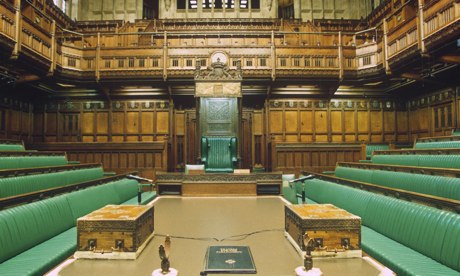Democratic process is hard to get right, but currently, MPs are unable to bend the government's will towards what their constituents want

The House of Commons. 'Parliament can make its voice heard, but it can hardly change government's mind.' Photograph: Rex Features
On Monday, something happened in the House of Commons that should cause electors to wonder what parliament is for. The motion before the house was that “a commission of inquiry be established to investigate the impact of the government’s welfare reforms on the incidence of poverty”. At the vote the government was defeated by 125 votes to two. The result: nothing at all – it wasn’t reported and the government is ignoring it.
So what is parliament’s role meant to be? The textbooks will say it is to hold the government of the day to account, particularly on any legislation brought forward. But the chances of influencing that legislation are negligible because the government commands a whipped majority at every stage of a bill’s passage through the commons. Certainly, parliament can make its voice heard, but it can hardly change anything that the government has decided to do. The only rare exception is when there is a revolt on the government benches which is backed by the opposition, and even then when the government lost a vote on that basis last year on the EU budget, it still ostentatiously dismissed the vote as merely ‘advisory’.
Nor, it seems from Monday’s vote, can parliament take any effective initiative of its own either. The new settlement which was thought to have been generated in 2010 by the MPs’ expenses scandal is already crumbling. The backbench business committee, which for the first time gives parliamentarians some control over what is debated in the house, is being sidelined and decisions on its motions ignored. The promised house business committee, which would share negotiations between government and parliament over the passage of all business put before the house, has been quietly dropped. Only the election of members of select committees by the house, not by the whips, has so far survived, but one cannot help wondering if that too will be taken back by the party establishments over time.
There is a major constitutional issue here. The government arbitrarily takes the view that unless it is defeated on its own business – almost impossible – all other votes are regarded as advisory and set aside. This will begin to matter when there is a public petition which gains enough signatures to secure the right to a debate in parliament and then, if the government loses, nothing happens.
Read more...